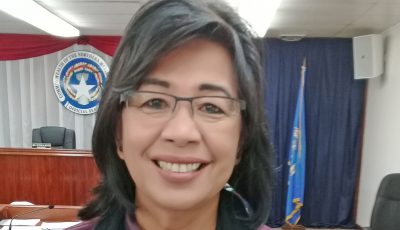2 of 3 claims by Chinese teacher who sued for police brutality at airport dismissed
U.S. District Court for the NMI Chief Judge Ramona V. Manglona yesterday dismissed two of the three claims against the U.S. government filed by Yu Min Zhao, a Chinese teacher who alleged that eight U.S. Customs and Border Protection officers denied her entry to Saipan on suspicion that she was pregnant and that she was handcuffed, her face slammed against the wall, and placed in isolation for 22 hours.
In granting the U.S. government’s motion to dismiss, Manglona ruled that because as a matter of law Zhao cannot plead facts that would show CBP officers lacked authority to detain her for inspection, the dismissal as to the first cause of action for false imprisonment/arrest is with prejudice.
Dismissal with prejudice means Zhao cannot re-open her claim for false imprisonment/arrest.
Manglona also dismissed without prejudice Zhao’s second cause of action for intentional infliction of emotional distress.
Dismissal without prejudice means the plaintiff can re-file her claim for intentional infliction of emotional distress.
In an eight-page order, Manglona said while Zhao says the rough treatment was painful, she does not allege she was physically injured.
Manglona said Zhao does not allege that any additional physical force was applied against her once she had been cuffed and searched.
“The police conduct she describes does not exceed the bounds tolerable to a civilized society,” the judge pointed out.
The U.S. government only moved to dismiss the two claims. The third claim is assault and battery.
Zhao, through counsel Samuel Mok, alleged that her husband, Li, was questioned first on that same day by a CBP officer and was admitted under the Guam-CNMI Visa Waiver Program without incident.
Mok stated in the complaint that Zhao, a school teacher in China, wanted to visit Saipan with her husband, Li, as a tourist for a weeklong vacation.
Mok said the incident happened on Oct. 18, 2013, at 3:10am, soon after the couple arrived at the Saipan International Airport from Beijing via a China Eastern Airlines charter flight.
In the U.S. government’s motion to dismiss the two claims, its primary argument for dismissal of false arrest and imprisonment, is that the officers had authority to arrest and detain Zhao.
The U.S. government asserted that Zhao fails to state a claim for false arrest because she has not plausibly pled that the CBP officers lacked lawful authority to detain her.
Mok argued that Zhao has pled that her detention was unlawful because the U.S. government had “no articulable facts connecting her to criminal activity or providing probable cause.”
In her order, Manglona said unlike in a Fourth Amendment claim against law enforcement officers based on an unreasonable search or seizure, CBP officers do not need to be investigating a crime or have probable cause to detain an alien at the border while determining whether she should be permitted to enter the country.
On Zhao’s allegations she was handcuffed and held incommunicado, Manglona said these allegations may go to the conditions of her confinement, but not whether immigration officers lawfully arrested her.
“Conditions of confinement are not an element of a false imprisonment claim,” the judge pointed out.



























